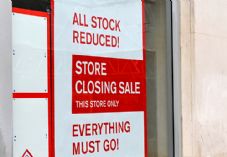UK DIY News
GlobalData: UK Retail Spend Expected To Fall By 5.6% In December

Retail’s golden quarter is being tarnished in the UK by high inflation along with the surrounding economic uncertainty. New forecasts from GlobalData, a leading data and analytics company, show that UK shoppers are set to spend £4.7 billion less in Q4 2022 than in the same period a year ago.
Y-o-Y % value growth of UK retail by month
| Month | Food | Non-food | Total |
| Oct 2022 | 3.8% | -9.8% | -3.6% |
| Nov 2022 | 4.3% | -11.6% | -4.5% |
| Dec 2022 | 5.2% | -13.2% | -5.6% |
Patrick O’Brien, UK Retail Research Director at GlobalData, comments: “Soaring inflation has caused food bills to rise rapidly, and we expect that while shoppers will still treat themselves over Christmas, they will essentially be spending more to get less. As a result of consumers spending extra on food, there will be less left over for non-essentials, and many consumers will reduce spend on other holiday-related items such as gifts.”
The unravelling of the government’s mini-budget has seen an increase in mortgage interest rates, a reversal of tax cuts, and the truncating of energy bill support. This will have served as a warning to many that 2023 is going to be more difficult than expected. Consumers will be much more circumspect about going into further debt to prop up spend if they are able to avoid it. The ongoing crisis in government is also increasing uncertainty about shoppers’ financial outlooks, and their lack of visibility will lead to a tightening of belts.
Y-o-Y % value growth of UK retail by month, Online/Offline
| Month | Online | Offline | Total |
| Oct 2022 | -5.4% | -3.1% | -3.6% |
| Nov 2022 | -9.5% | -2.8% | -4.5% |
| Dec 2022 | -12.9% | -2.6% | -5.6% |
O’Brien continues: “While we expect both online and offline retail to suffer poorer total sales this Christmas, e-commerce will fare far worse than physical retail. Some of this is down to the comparative Christmas period being distorted by a reduction in footfall caused by the spread of the Omicron variant, but the results are also influenced by shoppers indicating that they no longer see shopping online as a route to lower prices.
“During the last major recession of 2009, online shopping was boosted by shoppers using e-commerce to shop for the best price, but over time, physical retail has become more competitive with multichannel retailers offering standard pricing across channels and being more competitive with pureplays. More recently, retailers are more reluctant to subsidise their online offers with free delivery and returns.”
Food & grocery
Spend on food & grocery in Q4 will rise 4.4% on last year, peaking in December at +5.2%, as inflation forces consumers to allocate more of their Christmas budget on not just festive fare and treats but also daily essentials. Volumes over the golden quarter will fall 10.6% on last year – the worst volume performance the UK has seen in over 40 years and a stark reflection of consumers cutting back, going without, and minimising waste.
GlobalData anticipates that some consumers will scale back on entertaining and parties this Christmas as they try to protect budgets, impacting the volume performance of alcohol, party food/nibbles and desserts in the run up to Christmas and over the new year. Core Christmas meal categories will be somewhat safeguarded, but smaller meat portions and reduced pack sizes of premium trimmings will be sought after as consumers prioritise only what they really need. The winners this Christmas will be Aldi, Lidl, Tesco and Marks & Spencer – a trend GlobalData has witnessed over the course of the year, with value, innovation and product availability key to driving footfall and protecting shopper loyalty.
Health & beauty
Although health & beauty items are popular gifts with fragrance and make-up being affordable luxuries to treat friends and family to, GlobalData forecasts that this Christmas will be tough with Q4’s sector spend declining 3.3% versus last year with December being the worst performing month. High inflation will persist and although GlobalData expects retailers to offer discounts to convince shoppers to buy, following the clear focus on price throughout the year from specialists including Boots and Superdrug, volumes will be in significantly negative territory as shoppers cut back.
O’Brien notes: “Traditionally the season for illness, with health consciousness remaining high post-pandemic, we expect consumers to spend on medicines and remain highly aware of the spread of germs as 2022 will be the closest to a normal, sociable festive season we’ve had in three years.”
Clothing & footwear
Clothing & footwear is forecast to decline by 13.7% in Q4 2022, making it the toughest quarter for the sector this year, as the peak of inflation drives consumers to cut back on non-essential items to prioritise necessities like energy or food, as well as Christmas gifts. While November will be the weakest month, the decline is then expected to soften slightly in December, as many shoppers will be looking to purchase festive outfits, having not bought any last year when parties were cancelled due to the Omicron COVID-19 variant.
Home & electricals
The home categories outperform non-food in Q4 2022 but will still experience sharp declines because of low demand for big-ticket items. Furniture and floorcoverings will be hardest hit as the weaker order books from the summer and autumn filter through. Within homewares, insulating items such as blankets and filled bedroom textiles will be the best performing.
Despite a soft comparative, Q4 remains the weakest quarter for electricals in 2022. Many consumers replaced old items during the pandemic, so have no need to purchase again so soon. Black Friday will support items such as TVs, games consoles and laptops, but limited innovation and newness in the market this year will lower demand.
Source : GlobalData
Insight provides a host of information I need on many of our company’s largest customers. I use this information regularly with my team, both at a local level as well as with our other international operations. It’s extremely useful when sharing market intelligence information with our corporate office.











































